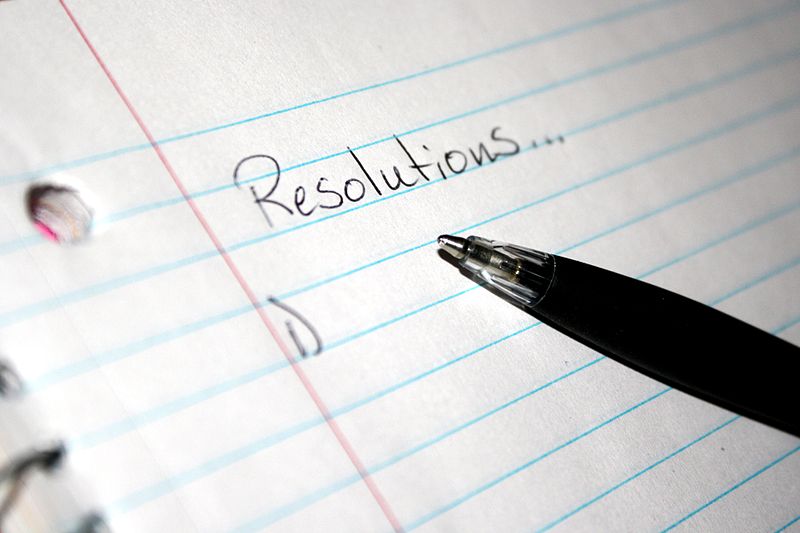
Envision your life in 2016 with half the stress and double the energy. Who wouldn’t want to have that?
While virtually everyone aspires to better health, it’s not a secret that the majority of health-related New Year’s resolutions fail. We are inclined to create resolutions that are too difficult or too complicated—all in the name of getting fast, drastic results.
But instead of trying for the rapid fix, the new year is a chance to start lifestyle adjustments that are simple and effortless to maintain—so that over time they come to be habits, gradually but surely bringing you nearer to optimum health.
Here are five simple resolutions you can employ right now for a healthy 2016.
1. Institute a new health mindset
It’s a common story: you start the most recent fad diet and you’re feeling pretty great. Then, a couple of weeks into the plan, and you have a birthday party to attend. You arrive determined to be responsible, but you can’t resist the cake and ice cream. Diet over.
Giving up in this manner is a manifestation of an all-or-nothing approach to diet and health. Rather than quiting when you cheat on your diet, view your current level of health as sitting someplace along a continuum. Every decision you make moves you closer to one end (good health) or the other end (poor health).
The cake and ice cream pushed you to the wrong end of the continuum, but that doesn’t imply you need to advance in the same direction for the remainder of the day, week, or month. It’s okay to have that piece of cake occasionally, provided that the bulk of your decisions move you in the right direction.
Implementing healthy habits calls for a short memory. You will slip-up every so often. What counts is your response, and how you’ll work toward making more healthy than unhealthy decisions going forward.
2. Establish a moderate, well-balanced diet
Fad diets practically never succeed. The fact is that they are not sustainable, meaning that even if they do work in the short-term, you’ll likely just gain back the pounds.
Fad diets are focused on deprivation of some kind. No carbs, no fats, only 1,000 calories per day. It’s like if I proposed that you’d be more productive on the job if you didn’t check your email for a month. During that month, you would probably get a lot more work done.
But what would materialize at the end of the month? You’d consume the majority of your time reading through emails, catching up, and losing all the productivity you had achieved.
The same phenomenon applies to deprivation diets. In fact, studies show that people often gain more weight back than they lose after the completion of a temporary fad diet.
So what’s the solution?
Moderation. Remember our health continuum? It’s okay to have a bag of chips or a cheeseburger from time to time. Individual foods are not as important as your overall diet. As long as most of your choices are healthy, you’re moving along the continuum in the right direction.
3. Combine exercise into your daily routine
If you intend to write a novel, and you force yourself to write the entire thing all at once, you’ll never make it to the end. But, if you commit to writing one page per day, you’ll have 365 pages to work with at the end of the year.
Everyone understands they should be exercising. The problem is equivalent to fad diets: the adoption of an all-or-nothing attitude. You purchase a gym membership and pledge to commit to 7 days a week, two hours a day, for the rest of your life. Two weeks in, you miss a few days, deactivate your membership, and never return.
All or nothing. You’re focused on the days you miss going to the gym when you should be focusing on the times you do go to the gym. Each gym trip moves you closer on the continuum toward good health.
You can additionally include physical activity at work and elsewhere during the day. Choose the stairway instead of the elevator, park your car farther away from the store entrance, complete some pushups on your lunch break. Each one of these activities tip the balance to good health.
4. Lessen stress
There are essentially three ways to manage stress:
- Eliminate the source of your stress, if possible
- Reframe the stress into something beneficial
- Engage in relaxing activities more often
This will be different for everyone, but here’s an example of a resolution incorporating all three methods.
Eliminate – certain activities and responsibilities produce more stress relative to the benefits acquired. If you discover, for instance, that you spend the majority of your day on social media, but the stress of updating your status offers little reward, you may consider ditching your accounts.
Reframe – Have you ever noticed that the same experience can be stressful for one person, yet thrilling for another? For example, some people despise public speaking while others love it. It is possible, but not easy, to reframe your feelings of anxiety into positive energy you can use to defeat your fears.
Relax – What do you enjoy doing the most? What is most relaxing to you? Listening to music? Reading? Camping? Meditating? Whatever it is, find ways to open your schedule to do more of it and the stress will fade away.
5. Schedule regular hearing tests
And finally, consider booking a hearing test this year. While this may seem insignificant, it’s not—one out of 5 people in the US suffers from some degree of hearing loss and most do nothing about it.
Hearing loss is linked to multiple significant medical conditions, such as depression, cognitive decline, and even dementia. Not to mention the constant struggle to hear as a major source of stress.
Enhancing your hearing is a great way to minimize stress, reinforce relationships, and enhance your overall health and well-being.